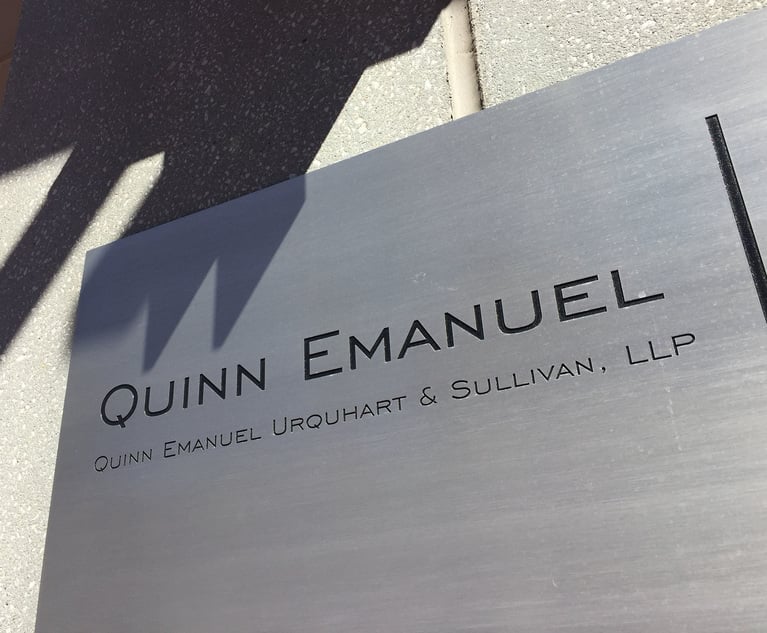Judge Presses Lead Plaintiff in State Street Bank Lawsuit on Overbilling Questions
A Boston federal judge has ordered the head of a pension fund to explain why the fund should still continue to be lead plaintiff, in light of suggestions that it didn't catch millions of dollars in overcharges by lawyers leading the class action.
May 31, 2018 at 07:25 PM
5 minute read
 State Street (Photo: Shutterstock)
State Street (Photo: Shutterstock)
A Boston federal judge has ordered the executive director of a pension fund to file an affidavit next week addressing whether the fund can continue to serve as lead plaintiff in a securities class action against State Street Bank or hire new lawyers in light of a special master's report reviewing potential overbilling in the case.
In a Thursday order, Judge Mark Wolf of the U.S. District Court for the District of Massachusetts told George Hopkins, the executive director of the Arkansas Teacher Retirement System, to file an affidavit by June 6 that states “whether ATRS wishes to continue to represent the customer class, and if so, whether it intends to continue to seek legal advice concerning this case from Labaton or seek advice instead from counsel whose conduct is not at issue.”
The order comes a day after Wolf held a hearing about a report that the special master, Gerald Rosen, a retired federal judge from the Eastern District of Michigan, filed on May 14. The report reviewed a $75 million fee request by New York's Labaton Sucharow and two other plaintiffs firms, Lieff Cabraser Heimann & Bernstein and the Thornton Law Firm in Boston. The hearing, in which Hopkins testified, followed a May 25 order in which Wolf said he was considering appointing new class counsel because the report raised questions about whether the pension fund adequately represented the class as lead plaintiff.
Labaton issued a statement in light of the order: “We believe George Hopkins, executive director of ATRS—who served as class representative in the State Street litigation—has done an outstanding job representing the class throughout the entirety of the six-year case. We're confident that George will follow the judge's order and make a decision that is in the best interests of the class.”
Lawyers for Lieff Cabraser and the Thornton Law Firm did not respond to requests for comment.
The report is under seal. The plaintiffs firms have raised concerns about redactions, particularly since Rosen's investigation resulted in about 10,000 pages, including dozens of depositions, according to court filings. In Thursday's order, Wolf outlined a series of deadlines for both the plaintiffs lawyers and Rosen to submit redaction proposals and any responses or objections. He has scheduled a possible hearing for June 22.
Wolf appointed Rosen a year ago to look into potential overbilling in a $300 million settlement of securities class actions alleging State Street overcharged pension fund clients in connection with foreign currency trades.
The three firms admitted to double-counting hours relating to staff attorneys but continued to defend their fee request. They also agreed to pay up to $2 million for the special master's investigation, but in documents this month indicated that the cost had risen to $3.8 million.
Rosen has delayed his report several times.
In February, he sought a delay to give plaintiffs lawyers more time to respond to an 85-page expert report that New York University School of Law professor Stephen Gillers prepared for him as part of the investigation. He noted at that time that his final report could have “serious and far-reaching adverse ramifications” for plaintiffs firms in the case and “for the practice of the plaintiffs' class action bar.”
It's not the first time Wolf has questioned a lead plaintiff's relationship to its lawyers. Last year, in a case he cited in State Street when ordering this week's hearing, Wolf denied a motion to appoint New York's Pomerantz as lead counsel in consolidated securities class actions against Tokai Pharmaceuticals after raising concerns about the reliability of the lead plaintiff.
At a Sept. 28 hearing on the motion, Wolf grilled Pomerantz co-managing partner Jeremy Lieberman about a certification that Steve Maxon, the firm's purported client, had signed stating that he understood what his duties would be under the Private Securities Litigation Reform Act of 1995 should he be lead plaintiff, according to a transcript.
“Where does it say he recognizes he's got a duty to supervise counsel?” he asked.
“Your honor, the PSLRA doesn't require that,” Lieberman responded.
“Actually, it does,” Wolf said.
He also asked about Maxon's electronic signature on the certificate, questioned why Pomerantz didn't have a fee agreement with him and mentioned the State Street case, in which he'd already appointed a special master.
“It was represented to me that they had regular billing rates of certain amounts and they were reasonable, and it turns out they weren't billed to anybody,” he told Lieberman. Wolf issued a March 16 order concluding that Maxon and Pomerantz would have been inadequate lead plaintiffs due in large part false statements made under oath.
Had they been appointed, he wrote, “this case would have been conducted by unsupervised plaintiffs' attorneys—a practice the PLSRA was intended to end.”
This content has been archived. It is available through our partners, LexisNexis® and Bloomberg Law.
To view this content, please continue to their sites.
Not a Lexis Subscriber?
Subscribe Now
Not a Bloomberg Law Subscriber?
Subscribe Now
NOT FOR REPRINT
© 2025 ALM Global, LLC, All Rights Reserved. Request academic re-use from www.copyright.com. All other uses, submit a request to [email protected]. For more information visit Asset & Logo Licensing.
You Might Like
View All

Kraken’s Chief Legal Officer Exits, Eyes Role in Trump Administration
3 minute read
FTC Chair Lina Khan Sues John Deere Over 'Right to Repair,' Infuriates Successor
6 minute read
Quinn Emanuel Files Countersuit Against DOJ in Row Over Premerger Reporting
3 minute readTrending Stories
- 1Can a Law Firm Institutionalize Its Culture? Boies Schiller’s New Chairman Will Try
- 2Full 8th Circuit Hears First Amendment Challenge to School District’s ‘Equity Training’
- 3Exploring Generative AI’s Impact on Intellectual Property
- 4Training Lawyers in AI and Using AI to Boost Training
- 5EB-5 Rebounds After a Rocky Year: Challenges of 2024 Lay Groundwork for a Booming 2025
Who Got The Work
J. Brugh Lower of Gibbons has entered an appearance for industrial equipment supplier Devco Corporation in a pending trademark infringement lawsuit. The suit, accusing the defendant of selling knock-off Graco products, was filed Dec. 18 in New Jersey District Court by Rivkin Radler on behalf of Graco Inc. and Graco Minnesota. The case, assigned to U.S. District Judge Zahid N. Quraishi, is 3:24-cv-11294, Graco Inc. et al v. Devco Corporation.
Who Got The Work
Rebecca Maller-Stein and Kent A. Yalowitz of Arnold & Porter Kaye Scholer have entered their appearances for Hanaco Venture Capital and its executives, Lior Prosor and David Frankel, in a pending securities lawsuit. The action, filed on Dec. 24 in New York Southern District Court by Zell, Aron & Co. on behalf of Goldeneye Advisors, accuses the defendants of negligently and fraudulently managing the plaintiff's $1 million investment. The case, assigned to U.S. District Judge Vernon S. Broderick, is 1:24-cv-09918, Goldeneye Advisors, LLC v. Hanaco Venture Capital, Ltd. et al.
Who Got The Work
Attorneys from A&O Shearman has stepped in as defense counsel for Toronto-Dominion Bank and other defendants in a pending securities class action. The suit, filed Dec. 11 in New York Southern District Court by Bleichmar Fonti & Auld, accuses the defendants of concealing the bank's 'pervasive' deficiencies in regards to its compliance with the Bank Secrecy Act and the quality of its anti-money laundering controls. The case, assigned to U.S. District Judge Arun Subramanian, is 1:24-cv-09445, Gonzalez v. The Toronto-Dominion Bank et al.
Who Got The Work
Crown Castle International, a Pennsylvania company providing shared communications infrastructure, has turned to Luke D. Wolf of Gordon Rees Scully Mansukhani to fend off a pending breach-of-contract lawsuit. The court action, filed Nov. 25 in Michigan Eastern District Court by Hooper Hathaway PC on behalf of The Town Residences LLC, accuses Crown Castle of failing to transfer approximately $30,000 in utility payments from T-Mobile in breach of a roof-top lease and assignment agreement. The case, assigned to U.S. District Judge Susan K. Declercq, is 2:24-cv-13131, The Town Residences LLC v. T-Mobile US, Inc. et al.
Who Got The Work
Wilfred P. Coronato and Daniel M. Schwartz of McCarter & English have stepped in as defense counsel to Electrolux Home Products Inc. in a pending product liability lawsuit. The court action, filed Nov. 26 in New York Eastern District Court by Poulos Lopiccolo PC and Nagel Rice LLP on behalf of David Stern, alleges that the defendant's refrigerators’ drawers and shelving repeatedly break and fall apart within months after purchase. The case, assigned to U.S. District Judge Joan M. Azrack, is 2:24-cv-08204, Stern v. Electrolux Home Products, Inc.
Featured Firms
Law Offices of Gary Martin Hays & Associates, P.C.
(470) 294-1674
Law Offices of Mark E. Salomone
(857) 444-6468
Smith & Hassler
(713) 739-1250










